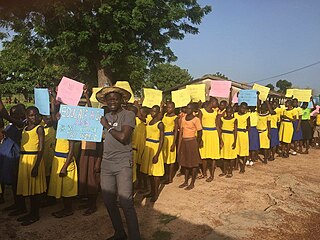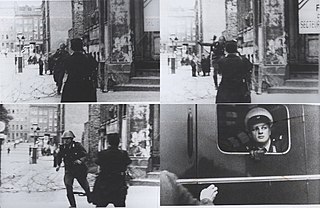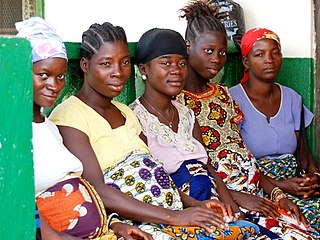
Angola, officially the Republic of Angola, is a country on the west coast of Southern Africa. It is the second-largest Lusophone (Portuguese-speaking) country in both total area and population, and is the seventh-largest country in Africa. It is bordered by Namibia to the south, the DR Congo to the north, Zambia to the east, and the Atlantic Ocean to the west. Angola has an exclave province, the province of Cabinda, that borders the Republic of the Congo and the Democratic Republic of the Congo. The capital and most populated city is Luanda.

Universal access to education is the ability of all people to have equal opportunity in education, regardless of their social class, race, gender, sexuality, ethnic background or physical and mental disabilities. The term is used both in college admission for the middle and lower classes, and in assistive technology for the disabled. Some critics feel that this practice in higher education, as opposed to a strict meritocracy, causes lower academic standards. In order to facilitate the access of education to all, countries have right to education.

A refugee, generally speaking, is a displaced person who has crossed national boundaries and who cannot or is unwilling to return home due to well-founded fear of persecution. Such a person may be called an asylum seeker until granted refugee status by the contracting state or the United Nations High Commissioner for Refugees (UNHCR) if they formally make a claim for asylum. The lead international agency coordinating refugee protection is the United Nations Office of the UNHCR. The United Nations has a second office for refugees, the United Nations Relief and Works Agency (UNRWA), which is solely responsible for supporting the large majority of Palestinian refugees.

The International Rescue Committee (IRC) is a global humanitarian aid, relief, and development nongovernmental organization. Founded in 1933 as the International Relief Association, at the request of Albert Einstein, and changing its name in 1942 after amalgamating with the similar Emergency Rescue Committee, the IRC provides emergency aid and long-term assistance to refugees and those displaced by war, persecution, or natural disaster. The IRC is currently working in about 40 countries and 26 U.S. cities where it resettles refugees and helps them become self-sufficient. It focuses mainly on health, education, economic wellbeing, power, and safety.
Education in Iraq is administered by the Ministry of Education.

The Lost Boys of Sudan refers to a group of over 20,000 boys of the Nuer and Dinka ethnic groups who were displaced or orphaned during the Second Sudanese Civil War (1987–2005). Two million were killed and others were severely affected by the conflict. The term was used by healthcare workers in the refugee camps and may have been derived from the children's story of Peter Pan. The term also was used to refer to children who fled the post-independence violence in South Sudan in 2011–2013.

Primary education in the Democratic Republic of the Congo (DRC) is not free or compulsory.
The Albert Einstein German Academic Refugee Initiative Fund scholarship programme offers refugee students the possibility to pursue an undergraduate degree in their country of asylum. Through the dedicated support of the German Government, and additional private donors, UNHCR was able to support over 9,300 young refugees since 1992.
The second goal in the United Nations Millennium Development Goal is to achieve Universal Primary Education, more specifically, to "ensure that by 2015, children everywhere, boys and girls alike will be required to complete a full course of primary schooling." Education is vital to meeting all other Millennium Development Goals: "Educating children gives the next generation the tools to fight poverty and prevent disease, including malaria and AIDS." Despite the significance of investing in education, the recent report, Fixing the Broken Promise of Education for All: Findings from the Global Initiative on Out-of-School Children—produced by UNESCO Institute for Statistics and UNICEF found that the world has missed this 2015 target of universal primary education, and there are currently 58 million children, of primary school age, out of school worldwide.
Education For All (EFA) is a global movement led by UNESCO, aiming to meet the learning needs of all children, youth and adults by 2015. Education for All, is also a USA based 501 (c)(3) organization that strives to provide FREE education to disadvantaged underprivileged rural children, completely in line with UNESCO initiative.
The Don Bosco Foundation of Cambodia is a Non-profit organization of education founded in Cambodia in 1991 to give technical skill education to youth living in extreme poverty and to facilitate the schooling of marginalized children. The organization was a way to answer the needs of a country in its post-war period of reconstruction. DBFC is a branch of the Salesians of Don Bosco. The United Nations asked to the Salesians in Thailand to attend the children and youth of the Cambodian Refugee camps during the 1980s. DBFC answered this request by opening provisional technical schools in the camps. After the peace agreements, the organization was invited by the Cambodian government to settle in the country. The first printing press in Cambodia after the war, was provided by DBFC in the Don Bosco Technical School of Phnom Penh for the republishing, translating and writing of books and documents of education. Many schools were rebuilt in the villages and the Organization gained prestige as the first institution to provide technical education and to offer sponsorship to Cambodian children.

The diplomatic relationship between the United States of America and Zambia can be characterized as warm and cooperative. Relations are based on their shared experiences as British colonies, both before, after and during the struggle for independence. Several U.S. administrations cooperated closely with Zambia's first president, Kenneth Kaunda, in hopes of facilitating solutions to the conflicts in Rhodesia (Zimbabwe), Angola, and Namibia. The United States works closely with the Zambian Government to defeat the HIV/AIDS pandemic that is ravaging Zambia, to promote economic growth and development, and to effect political reform needed to promote responsive and responsible government. The United States is also supporting the government's efforts to root out corruption. Zambia is a beneficiary of the African Growth and Opportunity Act (AGOA). The U.S. Government provides a variety of technical assistance and other support that is managed by the Department of State, U.S. Agency for International Development, Millennium Challenge Account (MCA) Threshold Program, Centers for Disease Control and Prevention, Department of Treasury, Department of Defense, and Peace Corps. The majority of U.S. assistance is provided through the President's Emergency Plan for AIDS Relief (PEPFAR), in support of the fight against HIV/AIDS.

Education in Angola has six years of compulsory education, under the Angolan Education Law (13/01) of 31 December 2001. Basic adult literacy continues to be low, but there are conflicting figures from government and other sources. It is difficult to assess literacy and education needs. According to 2015 estimates, the literacy rate in Angola is 71.1% . On the other hand, the university system has been developing considerably over the last decade.
The history of education in Angola refers to the formal education in Angola during the different periods of Portuguese presence and colonial occupation as well as during the postcolonial phases.
RefugePoint is a non-profit organization founded in 2005. RefugePoint has referred over 54,000 refugees for resettlement.

Health in Angola is rated among the worst in the world.
Education in South Sudan is modelled after the educational system of the Republic of Sudan. Primary education consists of eight years, followed by four years of secondary education, and then four years of university instruction; the 8 + 4 + 4 system, in place since 1990. The primary language at all levels is English, as compared to the Republic of Sudan, where the language of instruction is Arabic. There is a severe shortage of English teachers and English-speaking teachers in the scientific and technical fields.
Frente Leste was the name of the theater of Portuguese Armed Forces' anti-guerrilla operations in the East of Angola, during the Portuguese Colonial War (1961-1974). After the success of the Portuguese military in the Eastern front by 1973, it started to be known as the Eastern Zone, since guerrilla warfare episodes were nonexistent. Through economic and social promotion campaigns, including the construction of healthcare, education, sanitation, transport and security infrastructure, the construction of new villages, the training of new black military units like the Flechas, and the foreign units known as the Fiéis and the Leais, the Portuguese operations in the late stage of the anti-guerrilla war in Portuguese Angola, eradicated all the main sources of conflict in the territory.
Maternal health in Angola is a very complicated issue. In the Sub-Saharan region of Africa where Angola is located, poor maternal health has been an ongoing problem contributing to the decreased level of health in the population in the early 21st century.

The extent of gender inequalities varies throughout Liberia in regard to status, region, rural/urban areas, and traditional cultures. In general, women in Liberia have less access to education, health care, property, and justice when compared to men. Liberia suffered two devastating civil wars from 1989–1996 and 1999–2003. The wars left Liberia nearly destroyed with minimal infrastructure and thousands dead. Liberia has a Human Development Report ranking of 174 out of 187 and a Gender Inequality Index rank of 154 out of 159.








